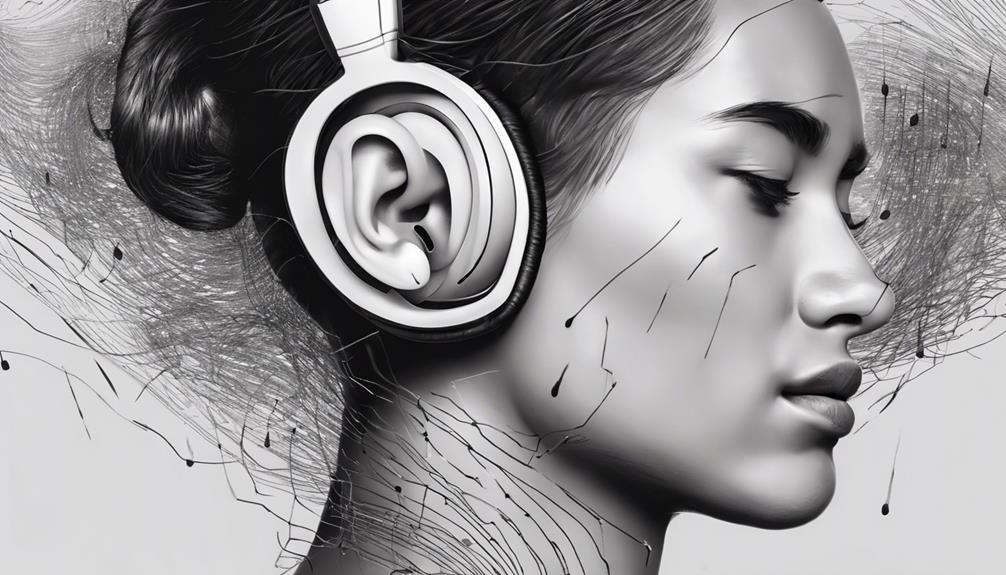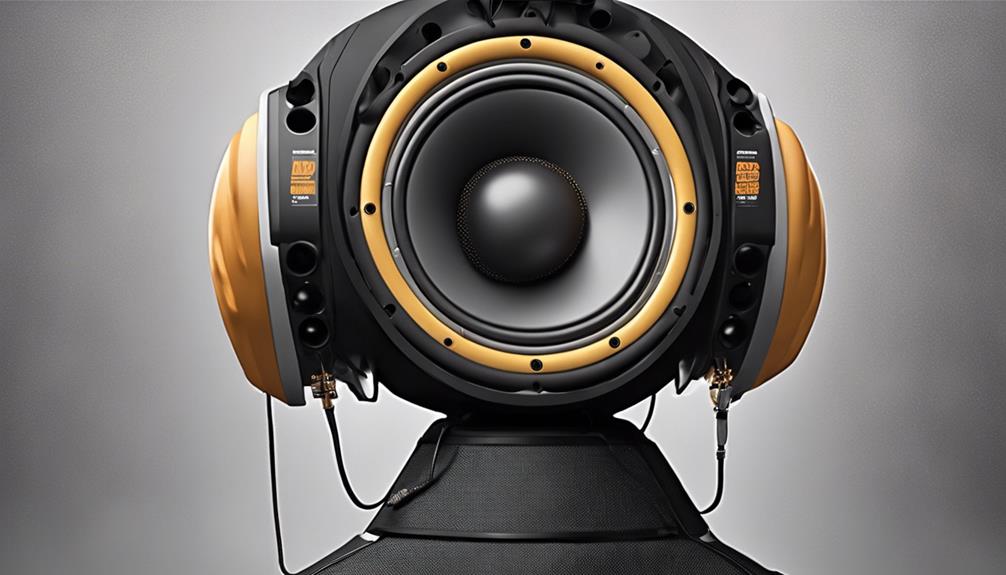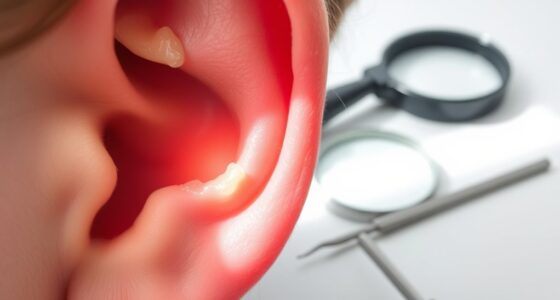When it comes to using AirPods, it is important to consider the impact they may have on our hearing. Many of us rely on these convenient devices for our daily audio needs, but what if it turns out that there are potential risks associated with prolonged use?
Let's explore the lesser-known effects of wearing AirPods and how it could be affecting our ear health in ways we might not have realized.
Key Takeaways
- Prolonged AirPods use at high volumes can lead to irreversible hearing damage.
- Monitoring volume levels and usage time is crucial for preventing hearing loss.
- Symptoms like tinnitus signal potential hearing issues from excessive noise exposure.
- Adhering to WHO guidelines on safe listening limits protects against long-term hearing harm.
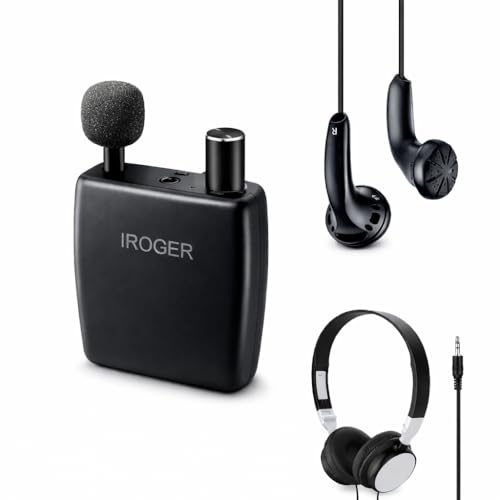
IROGER Hearing Amplifier for Seniors, Personal Sound Amplifier, Smart Auto-Gain, Directional Microphone, Rechargeable with 120-Hour Battery, Headphones & Earbuds Included
Smart Auto-Gain Control – Enjoy crystal-clear sound at all times. iRoger automatically balances audio levels to enhance voices...
As an affiliate, we earn on qualifying purchases.
Potential Risks of Prolonged AirPods Use
Prolonged use of AirPods at high volumes poses a significant risk of potential hearing loss due to excessive noise exposure. Research indicates that exposing our ears to loud sounds for extended periods can lead to irreversible hearing damage. When it comes to AirPods, excessive use without adhering to safe listening practices can amplify this risk. The World Health Organization recommends limiting the volume to 85 decibels for no more than 8 hours to prevent hearing damage from headphone use.
Symptoms such as temporary hearing loss and tinnitus (ringing in the ears) can serve as warning signs of potential hearing issues caused by AirPods. It's crucial to monitor the volume levels when using these devices and take regular breaks to give our ears a rest. By tracking our usage patterns and being mindful of how long we wear AirPods, we can significantly reduce the discomfort and long-term hearing damage associated with improper use.

Joanbro Personal Sound Amplifier for Seniors, Voice Enhancement Devices, Pocket Sound Amplifiers for Elderly People, Adults, 50dB Gain, with Headphones & Earbud, 3 Types Mics, 3 Tone, Volume Control
SUPERIOR PERSONAL SOUND AMPLIFIER: Applying noise cancelling, automatic gain control and advanced amplifying circuit, this sound amplifier device...
As an affiliate, we earn on qualifying purchases.
Understanding Decibel Levels and AirPods

To grasp the potential risks associated with AirPods usage, understanding decibel levels is essential in safeguarding our hearing health. Decibels measure sound intensity, and AirPods can reach levels that may cause hearing damage, especially when combined with high background noise.
Here are some key points to consider:
- AirPods users may unknowingly expose themselves to high decibel levels due to environmental noise.
- Monitoring AirPods decibel levels is crucial to prevent exceeding safe listening thresholds.
- Understanding safe listening ranges, typically in the 60s or 70s dB, can protect against hearing loss.
- High background noise can mask the actual loudness of AirPods, leading to potential risks for hearing damage.
- Adjusting listening habits and being aware of the sound levels in our surroundings can help mitigate the impact of high decibel levels on our hearing health.
Being mindful of decibel levels and our listening habits while using AirPods is key to preserving our hearing acuity and preventing long-term damage.

Neosonic Rechargeable Hearing Amplifier to Aid TV Watching and Conversation, Wireless Neckband Headphones for Seniors & Adults, Remote Microphone Noise Cancelling - NW10 Pro
BACKGROUND NOISE REDUCTION - Equipped with a wireless external microphone, the NW10 Pro allows you to place the...
As an affiliate, we earn on qualifying purchases.
Impact of AirPods on Hearing Health
The impact of AirPods on hearing health is significant, especially when used at high volumes for extended periods. Prolonged exposure to loud sounds from AirPods can result in hearing loss, as the delicate structures in our ears can be damaged by excessive noise. The World Health Organization (WHO) recommends safe noise levels to prevent hearing damage caused by prolonged AirPods usage, emphasizing the importance of protecting our hearing. Symptoms like ringing in the ears can indicate temporary hearing loss due to high AirPods volume, highlighting the need to be mindful of our listening habits. Monitoring our AirPods usage and being aware of volume levels can help prevent discomfort and potential hearing issues. Seeking advice from a professional on safe AirPods usage is crucial, especially for individuals with existing hearing loss, to ensure we protect our hearing for the long term.
| AirPods | Hearing Loss | High Volumes |
|---|---|---|
| Can lead to hearing loss | Excessive noise exposure | Prolonged exposure at loud volumes |
| WHO recommends safe noise levels | Prevent hearing damage | Importance of protecting hearing |
| Ringing in ears as a symptom | Temporary hearing loss | Need to monitor volume levels |
| Consulting professionals advised | Especially for those with hearing loss | Ensure long-term hearing health |

Dr.meter Noise Reduction Ear Muffs, Noise Cancelling Headphones for Adults, Kids Autism Sensory Ear Protection Earmuffs, 31dB Hearing Protection for Shooting Gun Range, Mowing, Fireworks, Concerts
【Comfort and Snug】: Say goodbye to bulky earmuffs! Dr.meter noise cancelling headphones are made of premium memory foam...
As an affiliate, we earn on qualifying purchases.
Tips for Protecting Your Hearing With Airpods
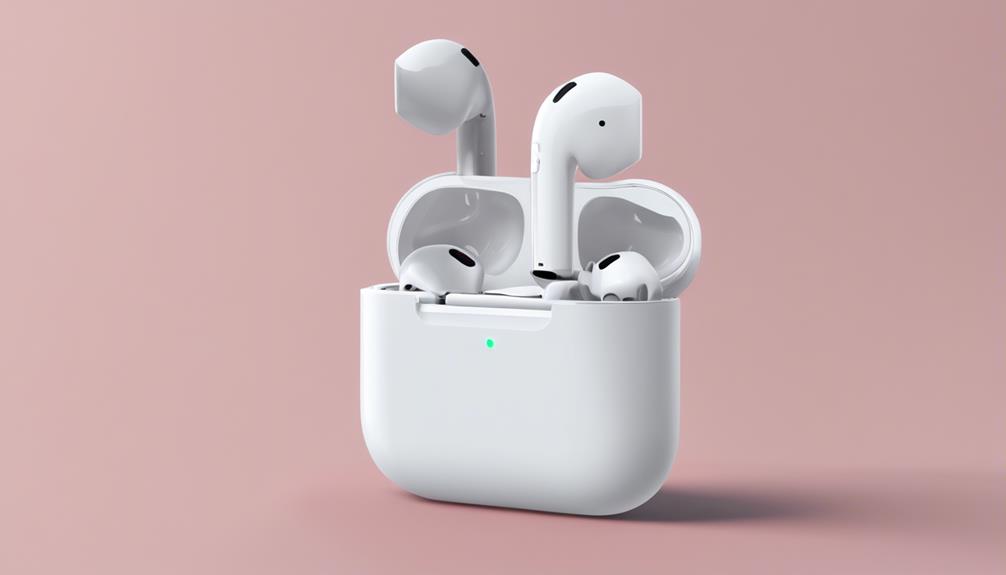
For optimal hearing health when using AirPods, it's essential to adhere to recommended volume levels and take regular breaks to prevent potential hearing damage. Listening at high volumes for extended periods can lead to hearing loss, so following guidelines is crucial. Here are some tips for protecting your hearing while using AirPods:
- Keep AirPods volume below 60% to reduce the risk of damage.
- Take regular breaks from using AirPods to prevent temporary or permanent hearing loss.
- Monitor daily AirPods usage time and volume levels to ensure they're within safe limits.
- Pay attention to symptoms like ringing in the ears, as they can indicate potential hearing damage.
- Consider using noise-cancelling features or apps to reduce the need for high volumes.
Comparing Safety: Airpods Vs. Over-Ear Headphones
When comparing the safety aspects of AirPods and over-ear headphones, it's important to consider the differences in sound isolation and potential impact on ear health.
Over-ear headphones excel in providing superior sound isolation compared to AirPods, effectively reducing direct exposure to the eardrums. This is primarily due to the larger design of over-ear headphones, which helps in lowering the relative decibel levels reaching the ears.
Additionally, the incorporation of noise-canceling technology in over-ear headphones offers robust capabilities for immersive sound experiences without compromising ear safety. However, it's crucial to use the noise-canceling features judiciously to prevent excessive volume exposure that could lead to hearing damage.
Therefore, balancing the convenience of AirPods with the responsible usage of over-ear headphones is essential for safeguarding ear health. Making an informed choice based on these factors can contribute significantly to maintaining optimal ear health while enjoying audio content.
Frequently Asked Questions
Can Wearing Airpods Affect Your Hearing?
Yes, wearing AirPods can affect your hearing. The high volumes emitted by AirPods can potentially lead to hearing loss over time. It's crucial to be mindful of the volume levels to prevent damage.
Symptoms like tinnitus may indicate damage. Regular monitoring and seeking professional advice if experiencing issues are essential.
Protecting our hearing by being cautious with AirPod usage is vital for long-term auditory health.
Is It Bad to Have Airpods at Full Volume?
We should avoid using AirPods at full volume as it can harm our hearing. Listening at high levels for extended periods may cause temporary or permanent damage.
World Health Organization suggests keeping the volume around 60% and limiting usage to an hour daily to safeguard our ears. Overexposure can lead to conditions like tinnitus.
Being cautious with volume and taking breaks can prevent long-term hearing issues.
What Are the Side Effects of Using Earbuds?
Using earbuds for extended periods can lead to hearing issues like tinnitus or even permanent damage. Excessive volume levels are particularly risky. To safeguard our hearing health, it's vital to be mindful of our headphone use.
WHO advises limiting headphone exposure to prevent potential harm. Monitoring volume levels, taking breaks, and being cautious with how we use earbuds can all contribute to maintaining healthy hearing.
Is Wearing One Airpod Bad for Your Ears?
Wearing one AirPod can lead to imbalanced sound exposure and potentially cause hearing damage in the overused ear. To prevent this, we should aim to use both AirPods to ensure a balanced sound experience.
Alternating between ears or using both AirPods helps maintain equal sound exposure, safeguarding our hearing health. Balancing our usage can protect our ears and offer a more enjoyable listening experience.
Conclusion
In conclusion, while using AirPods can enhance our listening experience, it's crucial to be mindful of the potential risks they pose to our hearing health. By understanding decibel levels, taking breaks, and keeping volumes at safe levels, we can enjoy our AirPods responsibly.
Some may argue that AirPods are no different from traditional headphones, but the proximity of AirPods to our eardrums can increase the risk of hearing damage. It's important to prioritize our ear health while enjoying the convenience of wireless earbuds.

